“In collaboration with the city of Asheville’s Office of Sustainability and Lenoir-Rhyne University’s Center for Graduate Studies of Asheville, I am conducting a survey of commercial waste-management practices in downtown Asheville.”


“In collaboration with the city of Asheville’s Office of Sustainability and Lenoir-Rhyne University’s Center for Graduate Studies of Asheville, I am conducting a survey of commercial waste-management practices in downtown Asheville.”
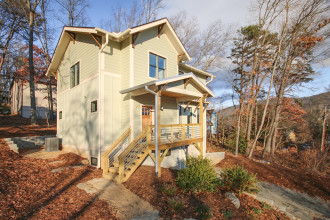
Local sustainable builders and the Western North Carolina Green Building Council reached an important milestone last month with the certification of the 1,000th Green Built North Carolina home in the greater Asheville area.
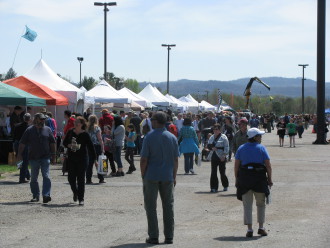
Crowds of locals and visitors converged on the Western North Carolina Agricultural Center Saturday and Sunday, April 11-12, to take in the sights, sounds and tastes of the 2015 Mother Earth News Fair. Click through for a slideshow of photos by Tori Pace.
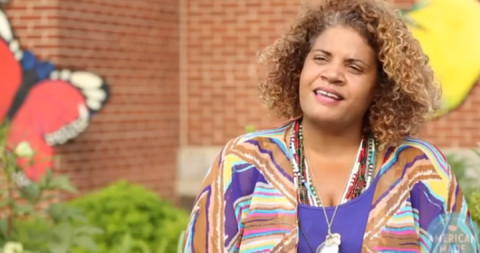
In her talk at UNC Asheville, Allen discussed how social justice is entwined with food — and she encouraged people to take action, saying, “I want you all to think big about what to do.”
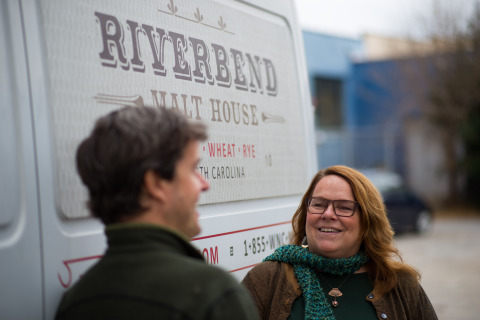
Last year, Accelerating Appalachia orchestrated the transfer of about $505,000 in investment funds toward sustainable, nature-based ventures in Western North Carolina. This year, the Asheville-based nonprofit — the region’s first social-impact business accelerator — partnered with impact investor Reinventure Capital for 2015 and recently invited businesses to submit funding applications online. Submissions for 2015 are due by […]
As Lenoir-Rhyne University wrapped up its third annual Taste of Bioneers conference on Friday night, Nov. 21, the panel presentation “Scaling Solutions for Social Change” took center stage. Three local business leaders fueled discussions about the opportunities and the challenges Asheville-area businesses face as they seek to expand their organizations and contribute to community sustainability as […]
Who knew that a pastime as pedestrian as gardening could be downright dangerous? On Wednesday night, around 20 people took refuge from November’s bluster at the Green Sage Café to hear Bill Jones, president of Carolina Native Nursery, explain both the risks of importing non-native species plants and the benefits of proliferating indigenous plant-life. The […]
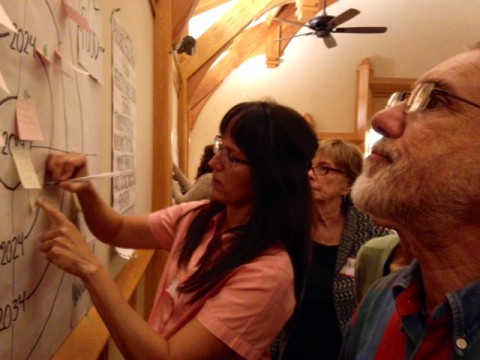
Can you imagine Asheville’s sustainable future? Forty years from now, walking down the streets, what do you see? What are you wearing? What are you eating? What do you hear? What do you smell? What might Asheville’s most positive potential feel like? Can you imagine it?
If a human being were forced into a physical contest with a lion, a tiger, or a bear (oh my), the result would be unlikely to favor the human. Nevertheless, in a world of lions and tigers and bears, human beings sit atop the food chain. Why? Because humans adapt. The human species owes its […]

The University of North Carolina at Asheville has announced the creation of a new institute that aims to be a national model for blending environmental study with business and sustainable economic growth in urban and rural landscapes.
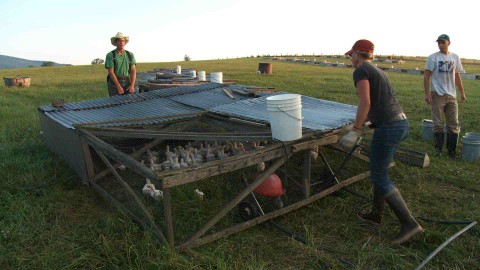
Last weekend offered multiple chances to see the “Lunatic Farmer” himself, Joel Salatin of Polyface Farms. Salatin has risen to notoriety through his appearances in Michael Pollan’s book, The Omnivore’s Dilemma and through his film appearances in Food, Inc. and Farmaggedon.
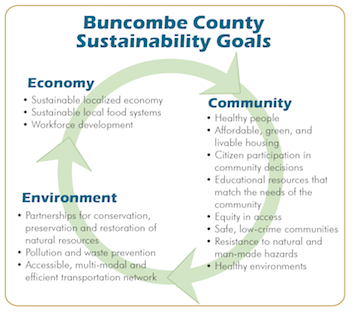
“In North Carolina, sustainability plans are pretty rare,” reports Scott Mouw, recycling director at the N.C. Department of Environment and Natural Resources. “Not many communities have taken on the task of comprehensively looking at their environmental footprint and worked through ways to reduce that footprint.” In fact, Buncombe County is one of only a handful in the state to have such a plan, unanimously adopted by the Board of Commissioners May 15, 2012. But what is it, exactly? And what does it mean for current and future residents?

Early voting for the Buncombe County Board of Commissioners primary starts April 24 — just two days after Earth Day. The juxtaposition underscores the fundamental link between sustainability and politics.
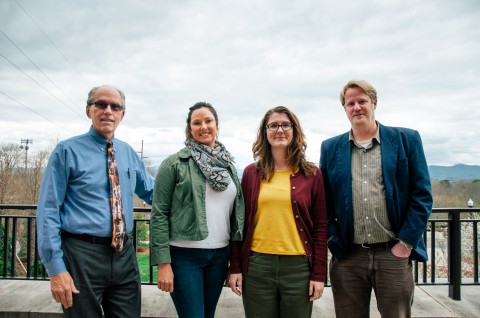
The first group of students in Lenoir-Rhyne University’s new sustainability studies program may be small, but the fruits of their research might eventually have a big local impact. Based at the Asheville campus, the new master’s degree program requires students to complete a “capstone” project combining graduate-level research with real-world conditions and needs. This spring, […]

The mission of Xpress’ first annual Get It! Guide is to provide locals and visitors with an introduction to the many ways we can engage and have a stake in creating a vibrant, sustainable community.
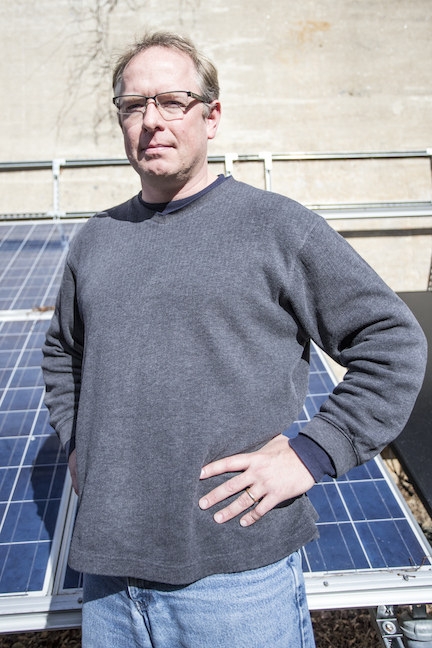
The international debate over climate change came home Dec. 3, as the Buncombe County commissioners butted heads over a proposal to reduce the county’s carbon footprint by 80 percent over time. Now, county staff is trying to figure out how to begin implementing the directive and determine how to measure the progress.
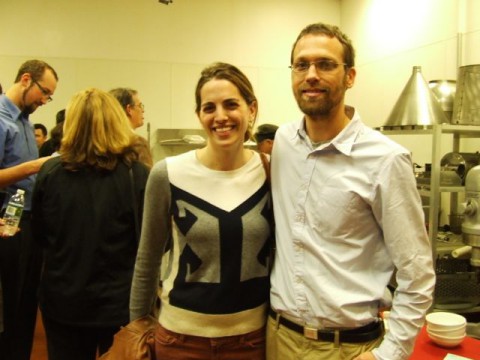
Advantage West held the “Fry Party” last week at a kitchen at Blue Ridge Food Ventures, located on AB-Tech’s Enka campus, to bring local attention to F3, an effort, according to project director Ron Townley, that pilots a new business model for the production of biodiesel from locally grown canola. The program, he says, is aimed at ultimately reducing Western North Carolina’s dependence on imported fuels by creating a partnership among area farmers, restaurants and biofuel producers.

A bike? A car? An ELF? It’s not the magical little creature we know from folklore. ELF stands for “Electric, Light, Fun.” It’s an OTV or Organic Transit Vehicle, and it was created by Durham, N.C.-based company Organic Transit.
On Nov. 11, Warren Wilson College hosted a panel discussion of six contributing authors of Small Stories, Big Changes. The authors shared their stories and experiences of working toward sustainability in their communities, as well as their ideas and goals when it comes to environmentalism in our society.
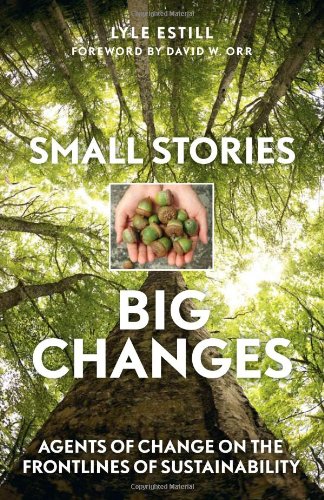
Warren Wilson to host panel discussion with contributing authors of a book on sustainability change-makers
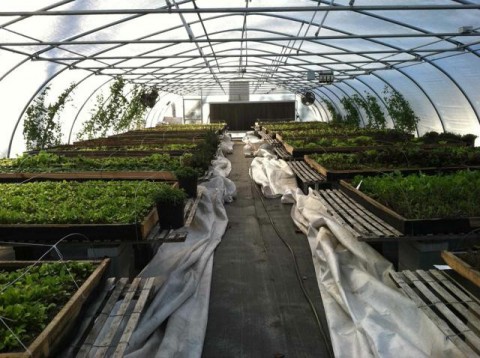
Miki Kilpatrick, co-owner of Homegrown Restaurant in Asheville, grew up canning tomatoes and pickles and freezing corn for winter. “Putting up,” as she calls it, was part of the seasonal routine back then.